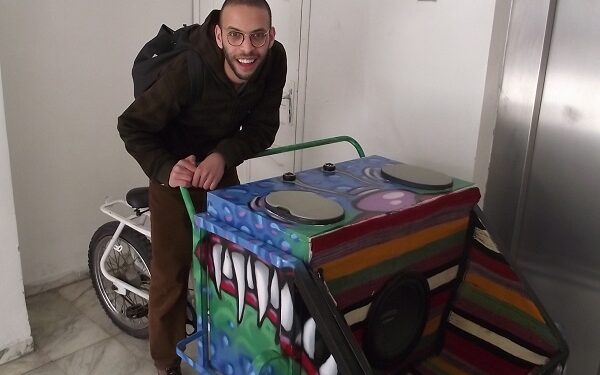No copyright, a dissemination that mainly goes through the Internet and social networks, the life of Tunisian rappers is not always easy. Yet these young enthusiasts try to bring their music to life.
Debo is a collective of Tunisian artists bringing together rappers, mixers, directors, executives, Bboys, sound engineers or composers. Created two years ago, the collective makes every effort so that art can live and emerge, as Kaïs alias Vipa reports, rapper within Debo:
(quote_box_center) Today we manage to make recordings, buy equipment. We did a tour throughout Tunisia, we went to Denmark. We are preparing the new album, we try to be active to the maximum. Sometimes it doesn’t bring a lot of money but it brings a lot of energy. When you do your job and you see that people appreciate it, that they want to see a sequel, it’s energy, it allows you to produce more. (/Quote_box_center)
No copyright
The 24 -year -old rapper fell into very small rap and decided, like two of his brothers, to go behind the microphone a few years ago. His clips are seen thousands of times on the internet, his songs broadcast on the radio, yet he has never had copyright for the dissemination of his productions:
“Author rights are very important. It is necessary to protect artists. As a citizen I download but when my music is affected I am looking for a solution. My clip is on television, without them consulting me, on the radio, they use the excuse of the promotion, but they never ask. For example there is a big word in your song, they put a “beep” of censorship without communicating before with the studio. He says.
His lifelong acolyte, rapper Massi evokes the difficulty of recording, when he started music in 2005:
(quote_box_center) Before they were unfavorable conditions, I had a helmet, a microphone and a small computer. I have been working with Vipa for a long time, it was a good experience but it is very difficult to love something and not know how to make it succeed. We did not have the internet at the beginning, so it was word of mouth that primaled. (/Quote_box_center) “I win”
Medusa Boutheina began her ascent in hip-hop by the Break Dance. She wanted to make music by dint of listening to it and dancing on it. First in French, then in Arabic and even in English, his texts speak of everything that touches it. But not easy to be able to record titles in Tunisia:
(quote_box_center) It’s difficult, the studios cost dear, it can go up to 250 dinars for a song. When I started, I was a student, so I pay with my savings. (/Quote_box_center)
Not easy either of being a woman among so many men: “I am accepted because I impose myself” says the young woman. In Tunisia, the number of rappers does not exceed 10: “It’s really hard, the environment is very macho. When I worked in Germany I saw that it was different. »Diffusion and download
Debo has a very original diffusion concept. They created what they call the ‘Bike Sound System’. It is a colorful bike with a bass box: “The last Debo mixtape ready, we took the bike sound system and we went out in the street, people listened, they could buy the album directly. »»
The other way to distribute remains the internet and this despite the illegal download as Vipa explains: (quote_box_center) only four years ago that YouTube opened in Tunisia. Young people must learn, let them download. (/Quote_box_center)
“I am very aware of the way it works in Tunisia,” says Massi, so I don’t get angry. I know very well that for a product to take its value it must be downloaded for free. It should be easy to consume. Because the cultivation of paid download does not exist. Today I do not see rap. »»
Medusa, on the other hand, stopped putting her titles for free on the internet: “Before I put my music but I stopped, it is difficult because it requires a lot of work and in the end you have nothing. Now I live in concerts, I have done a lot of collaboration in Europe, especially in Sweden and Germany ”.
World Intellectual Property Day will take place on April 26, 2015
Law n ° 94-36 of February 24, 1994, relating to literary and artistic property, modified and supplemented by law n ° 2009-33 of June 23, 2009: “Any exploitation or use of a protected work requires prior authorization from the author itself or its legal representative in return for remuneration in accordance with the law and the regulations in force in the field of literary and artistic property”.
Elodie potte








